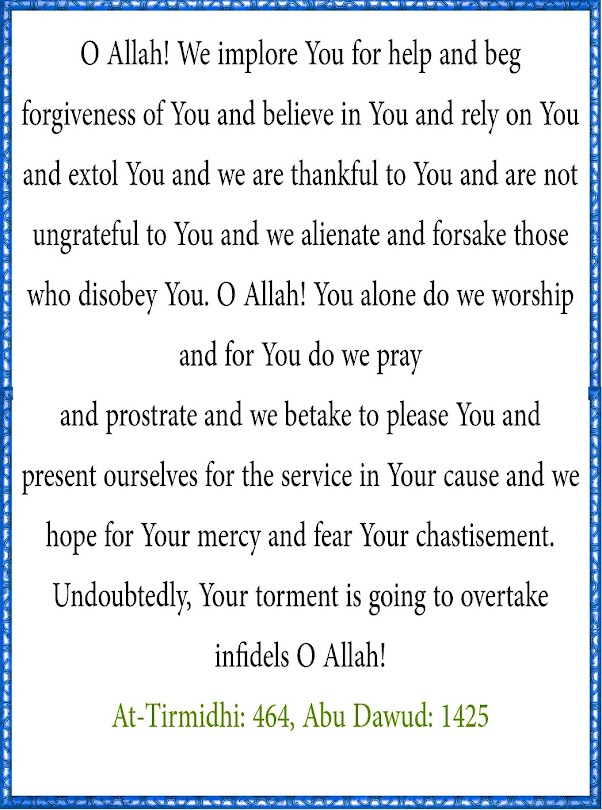Qunoot means humility, obedience and devotion. In Islam dua e qunoot is type of supplication that is recited after Surah Al-Fatiha and any other Surah during Qiyam in the last rakat of the three Witr of the Isha prayer.
What is Witr Prayer (Namaz) and how to Perform it?
Witr means odd number. Witr consists of three rakahs. The meaning of Witr is odd number and three rak'ahs represent an odd number due to which the Witr prayer is called Witr. In Islamic terminology, the Witr prayer is performed after the Farz (first 4 obligatory rakat) and sunnahs in the Isha prayer. Witr prayer consists of three rak'ahs. In witr it is wajib to add Surah after reciting Fatiha in every rakah. The method of performing the 3 witr rakahs is similar to other prayer. First perform 2 rakahs and in the third rakah after reciting surah in Qiyam, raise your hands to your ears before bowing(rukuh) and say Allahu Akbar as you do in Takbeer Tahirima, then bring your hands to its position as we do in Qiyam and read the Dua Qunut. it is obligatory to recite the Dua e Qunoot in witr.
In the light of the hadith, the Muslim Ummah agrees that we must perform Witr prayer; Because the Holy Prophet (peace and blessings of Allah be upon him) always used to perform the Witr prayer during his travels, and the Holy Prophet (peace and blessings of Allah be upon him) emphasized on praying the Witr prayer, even if a person could not pray the Witr prayer on time, should do it later.
Hazrat Abu Saeed Khudri says that the Messenger of Allah (may God bless him and grant him peace) said: Pray the Witr prayer before dawn.
The Prophet (peace and blessings of Allah be upon him) has ordered Muslims to perform Witr mention in several hadith. Missing the Witr prayer from the Prophet (peace and blessings of Allah be upon him) even once in his life is not proven even on the occasion of Hajj.
When to read dua e qunoot in witr
It is recited in the last rakah of the three witr of Isha prayer after reciting surah fatiha + surah.Can we recite surah ikhlas instead of dua e qunoot?
What to do, if Dua e Qunot is not memorized?
Rabbana atina fid dunya hasanatan wa fil Aakhirati hasanatan waqina ‘adhaban-nar (Surah Baqarah ayah 201)رَبَّنَآ ءَاتِنَا فِى ٱلدُّنْيَا حَسَنَةً وَفِى ٱلْـَٔاخِرَةِ حَسَنَةً وَقِنَا عَذَابَ ٱلنَّارِ
or Recite
Rabbighfir warham wa anta khairur rahimeen | رَبِّ اغْفِرْ وَارْحَمْ وَأَنْتَ خَيْرُ الرَّاحِمِينَ
or simple Recite
Allahummaghfirli | اَللَّهُمَّ اِغْفِرْ لِي
What to do if dua Qunut is forgotten?
If a person forgets to recite Dua Qunot in the third rakat of Witr prayer and goes into Ruku, and then remembers during Ruku, returns to Qiyam and recites Qunoot again, will this method be accepted? If a person forgets to recite the dua e Qunut in the third rakat of Witr prayer and goes into Ruku, then it is ordered, not to return to Qiyam to recite dua e Qunut, but to complete the prayer without reciting dua-e-qunoot and at the end do Sajdah Sahw.
Proof of Reciting Dua e Qunoot in Witr Prayer?
The Prophet (peace and blessings of Allah be upon him) used to recite various dua-e-Qunoot in the Witr prayer, and the due-Qunoot is generally recited in witr by Hanafis. It is proved by the Holy Prophet (peace and blessings of Allah be upon him). And the proofs are in the following books. These references are given short, so for full reference visit this page.
- The author Ibn Abi Shaiba (Vol: 2, page: 106)
- Author Abdul Razzaq (Vol: 3 page. 114)
- Al-Marasil Labi Dawood Sajistani (page: 118)
- Mukhtasar Qiyam al-Lail by Muhammad bin Nasr al-Maruzi (Vol: 1, page. 321)
- Sharah Maani ul-Asaar by Imam al-Tahawi (vol: 1, page. 249)
- Al-Dua Al-Tabarani (page. 238)
- Al-Sunan al-Kubra al-Bayhaqi (page. 299)
- Kanzu'l-Ummal Ali al-Muttaqi al-Hindi (Vol.: 8, page.75)
- AlDawatul Kabeer Baihaqi (Vol: 1, page: 559)
The reason for preferring Dua e Qunot?
The Hanaf (Islamic Scholars follow Imam Hanifa) have given priority to the above-mentioned Dua-e-Qunoot because:
First reason for preference: It is narrated from Khalid bin Imran that this Dua e Qunoot was taught to Hazrat Muhammad (PBUH) by Hazrat Gabriel. (Al-Marasil Abu Dawud, page 118)
Second reason for preference: Dua e Qunot is narrated by the following Companions (may Allah be pleased with them):
- Hazrat Umar bin Al-Khattab (RA).
- Abdullah Bin Masood (Radiyallahu Anhu)
- Ubi bin Ka'b (may Allah be pleased with him)
- Ali Ibn Abi Talib (Radiyallahu Anhu)
- Hazrat Usman bin Affan (RA).
- Khalid bin Abi Imran (RA).
- Anas bin Malik (RA).
Dua e Qunoot in Arabic
اَللَّهُمَّ إنا نَسْتَعِينُكَ وَنَسْتَغْفِرُكَ وَنُؤْمِنُ بِكَ وَنَتَوَكَّلُ عَلَيْكَ وَنُثْنِئْ عَلَيْكَ الخَيْرَ وَنَشْكُرُكَ وَلَا نَكْفُرُكَ وَنَخْلَعُ وَنَتْرُكُ مَنْ ئَّفْجُرُكَ اَللَّهُمَّ إِيَّاكَ نَعْبُدُ وَلَكَ نُصَلِّئ وَنَسْجُدُ وَإِلَيْكَ نَسْعأئ وَنَحْفِدُ وَنَرْجُو رَحْمَتَكَ وَنَخْشآئ عَذَابَكَ إِنَّ عَذَابَكَ بِالكُفَّارِ مُلْحَقٌ
Dua e Qunoot transliteration English
Dua e Qunoot in English Translation
O Allah! We implore You for help and beg forgiveness of You and believe in You and rely on You and extol You and we are thankful to You and are not ungrateful to You and we alienate and forsake those who disobey You. O Allah! You alone do we worship and for You do we pray and prostrate and we betake to please You and present ourselves for the service in Your cause and we hope for Your mercy and fear Your chastisement. Undoubtedly, Your torment is going to overtake infidels O Allah!
At-Tirmidhi: 464, Abu Dawud: 1425
At-Tirmidhi: 464, Abu Dawud: 1425
دعائے قنوت
رَبَّنَآ ءَاتِنَا فِى ٱلدُّنْيَا حَسَنَةً وَفِى ٱلْـَٔاخِرَةِ حَسَنَةً وَقِنَا عَذَابَ ٱلنَّارِ
یا
رَبِّ اغْفِرْ وَارْحَمْ وَأَنْتَ خَيْرُ الرَّاحِمِينَ
یا
اَللَّهُمَّ اِغْفِرْ لِي






Express Your Opinions in comments
EmoticonEmoticon